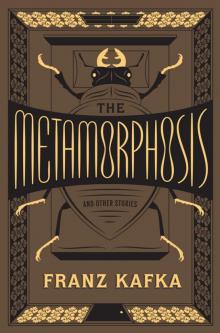- Home
- Franz Kafka
The Castle Page 7
The Castle Read online
Page 7
IV.
FIRST CONVERSATION WITH THE LANDLADY
He would have liked to have a confidential conversation with Frieda, but the assistants, with whom Frieda even joked and laughed every now and then, prevented this through their intrusive presence. Otherwise they weren’t demanding, they had settled down in a corner of the floor on two old skirts; their goal, which they often discussed with Frieda, was to avoid disturbing the surveyor and to take up as little room as possible, they made various attempts to bring that about, always to the accompaniment of whispers and giggles, by drawing in their arms and legs and huddling together, all one could see in their corner in the twilight was a large knot. Still, certain experiences in broad daylight had, alas, made it clear that they were attentive observers, they were constantly staring over at K., playing seemingly childish games, using their hands as telescopes and resorting to other such antics, or simply blinking at him while appearing to be engaged chiefly in tending their beards, which they set great store on and compared on countless occasions for length and thickness, letting Frieda be the judge. From his bed K. often watched the antics of the three of them with utter indifference.
Now when he felt strong enough to get up out of bed, they all rushed over to serve him. Yet he still wasn’t strong enough to resist their offers, he saw that in this way he was becoming somewhat dependent on them, which could have negative consequences, but he simply had to let it happen. Besides, it wasn’t so terribly unpleasant, sitting at the table drinking the good coffee Frieda had brought, warming himself at the stove Frieda had stoked, having the assistants run up and down the stairs ten times in their clumsy eagerness to bring him soap, water, a comb, a mirror, and finally, since K. had softly uttered a wish that could be interpreted that way, a little glass of rum.
Amid all this ordering and serving, more out of good cheer than in hope of success, K. said: “Now go away, you two, I have no further wishes for the present, and I want to speak to Miss Frieda alone,” and since he saw no outright protest in their faces, he added by way of amends: “And then the three of us will go to the council chairman, wait for me downstairs in the taproom.” Oddly enough, they complied, except for saying before they left: “We could also wait here,” to which K. responded: “I know, but I don’t want that.”
K. was annoyed but in a certain sense glad too, when Frieda, who had sat down on his lap once the assistants had left, said: “What have you got against the assistants, darling? We needn’t keep secrets from them. They are loyal.” “Loyal,” said K., “they’re constantly lying in wait for me, it is senseless and also quite repulsive!” “I think I know what you mean,” she said, clasping his neck and attempting to say something else, but she couldn’t go on, and since the chair stood by the bed they stumbled over it and fell down. They lay there, but without abandoning themselves as fully as that time at night. She sought something and he sought something, in a fury, grimacing, they sought with their heads boring into each other’s breasts; their embraces and arched bodies, far from making them forget, reminded them of their duty to keep searching, like dogs desperately pawing at the earth they pawed at each other’s bodies, and then, helpless and disappointed, in an effort to catch one last bit of happiness, their tongues occasionally ran all over each other’s faces. Only weariness made them lie still and be grateful to each other. Then the maids came up, “Look at the way they’re lying there,” one of them said, and out of pity she threw a sheet over them.
Later, when K. extricated himself from the sheet and looked about, the two assistants were back in their corner—this didn’t surprise him—warning each other to be serious by pointing at K. and saluting—but in addition to that, the landlady was sitting by the bed, knitting a sock, a small task ill-suited to her huge frame, which almost darkened the room. “I’ve been waiting a long time,” she said, lifting her wide face, which was criss-crossed and lined with age, but for all its massiveness, it was still smooth and had perhaps once been beautiful. Her words sounded like a reproach, an inappropriate one, for K. certainly hadn’t asked that she come. So he merely acknowledged her words with a nod and sat up, Frieda, too, stood up, but she moved away from K. and leaned against the landlady’s chair. “Landlady,” K. said distractedly, “could you postpone whatever you want to tell me until I get back from the council chairman’s? I have an important meeting there.” “Believe me, Surveyor, this is a more important matter,” said the landlady, “that is probably only about some work, while this is about a human being, about Frieda, my dear girl.” “Oh, I see,” said K., “then, yes indeed, though I don’t understand why you cannot leave this up to us.” “Out of love, out of concern,” said the landlady, and she drew Frieda’s head toward her; standing, Frieda only came up to the shoulder of the seated landlady. “If Frieda has such confidence in you,” said K., “so must I. Only a moment ago Frieda called my assistants loyal, so we’re among friends. And I can therefore tell you, Landlady, that I think it best that Frieda and I should marry, and very soon at that. Certainly, it’s unfortunate, most unfortunate, that I cannot replace what Frieda has lost through me, her position at the Gentlemen’s Inn and her friendship with Klamm.” Frieda raised her face, her eyes were full of tears, they did not seem at all triumphant. “Why me? Why was I chosen for this?” “What?” K. and the landlady asked with one voice. “She’s confused, the poor child,” said the landlady, “confused because of the coming together of so much happiness and misfortune.” And as if to confirm this, Frieda threw herself at K., kissed him wildly, and then, crying and embracing him as if there were nobody else in the room, fell on her knees before him. As he stroked Frieda’s hair with both hands, K. said to the landlady: “You seem to agree with me?” “You’re a man of honor,” said the landlady, who, even though her voice was tearful and she looked somewhat decrepit and had trouble breathing, still found the strength to say: “The only issue now is what kind of assurances you will have to give Frieda, for no matter how much I respect you you’re still a stranger, you cannot give references, we here know nothing about your domestic situation, so assurances are needed, but you, dear sir, can understand this, since it was, after all, you who pointed out how much Frieda is losing through this connection with you.” “Certainly, assurances, of course,” said K., “those are probably best given at the notary’s, though some other authorities of the Count may also start meddling with this. By the way, there’s something I absolutely must do before the wedding. I must speak with Klamm.” “That’s impossible,” said Frieda, rising slightly and pressing against K., “what an idea!” “I must,” said K., “and if I don’t succeed, you must.” “I cannot, K., I cannot,” said Frieda, “Klamm will never speak to you. How can you believe that Klamm will speak to you?” “But he would speak to you?” asked K. “No, that isn’t so,” said Frieda, “not to me, not to you, those are utter impossibilities.” She turned to the landlady, extending her arms: “Landlady, just see what he’s asking for.” “You’re odd, Surveyor,” said the landlady, who looked frightening now that she was sitting more upright, with her legs spread apart and her powerful knees pressing up through her thin skirt, “you’re asking for the impossible.” “Why is it impossible?” asked K. “I shall explain it to you,” the landlady said in a voice that sounded as though the explanation were not a final favor but the first in a series of punishments that she was handing out, “I shall gladly explain that to you. True, I don’t belong to the Castle and am only a woman and am only the landlady in one of the lowest-ranking inns—no, not the lowest-ranking, though not far from it—and so you may not attach any weight to my explanation, but I have gone through life with my eyes open and have come to know many different people and have had to carry the entire weight of the inn alone, for though my husband is a good lad all right, he isn’t a landlord and will never understand the meaning of responsibility. For instance, it’s only through his negligence—I was about to collapse that evening from exhaustion—that you are here in the village and can sit there on the bed in
peace and comfort.” “What?” K. asked, awakening from a certain distraction, roused more by curiosity than by anger. “It’s only thanks to his negligence,” cried the landlady again, pointing at K. with her raised forefinger. Frieda tried to calm her. “What is it you want,” said the landlady, turning her entire body in one quick motion, “the surveyor has asked me and I must answer him. Otherwise, how can he possibly understand something that is absolutely self-evident to us, namely, that Mr. Klamm will never speak to him—why am I saying ‘will’—can never speak to him. Listen here, Surveyor!, Mr. Klamm is a gentleman from the Castle, and that signifies in and of itself, even leaving aside Klamm’s other position, a very high rank, but what are you? You, the very person whom we are so humbly imploring that he might deign to consider marriage. You’re not from the Castle, you’re not from the village, you are nothing. Unfortunately, though, you are something, a stranger, one who is superfluous and gets in the way everywhere, one who is a constant source of trouble and who, for instance, makes it necessary for us to dislodge the maids, one who seduces our dearest little Frieda, one whose intentions are utterly unknown here, but who is unfortunately the very person to whom we must give her away. On the whole, though, I’m not blaming you for all this; I have already seen too much in life not to be able to bear this sight as well. But stop for a moment to consider the nature of your request. You expect a man like Klamm to speak to you. It pained me to hear that Frieda let you look through the peephole, in doing so, she was already seduced. But tell me, how could you bear the sight of Klamm? You needn’t say a word, I know, you had little difficulty bearing it. Indeed you cannot really see Klamm at all, and this isn’t arrogance on my part, for neither can I. You expect Klamm to speak to you, but he doesn’t even speak to people from the village, has never spoken to anyone from the village. It certainly was a great distinction for Frieda, a distinction that I, too, shall be proud of until the end of my days, that he would at least call her name and she could speak to him whenever she wished and was allowed to use the peephole, and yet he never spoke to her. And as for his calling Frieda now and then, that isn’t necessarily as significant as one might care to think, he merely called Frieda’s name—who knows what his intentions are?—and Frieda’s decision to rush over was naturally her own business and the fact that she was admitted without difficulty is simply due to the goodness of Klamm, but nobody can claim that he actually called her. And now all that, such as it was, is finished for all time. Klamm may still call Frieda’s name, that may be so, but a girl of that sort, who has consorted with you, will certainly never be admitted again. And there’s one thing, one thing this little head of mine cannot understand, how could a girl whom some people call Klamm’s mistress—and by the way I consider that a rather exaggerated term—even let you touch her?”

 Diaries of Franz Kafka
Diaries of Franz Kafka Metamorphosis and Other Stories
Metamorphosis and Other Stories The Castle: A New Translation Based on the Restored Text
The Castle: A New Translation Based on the Restored Text The Complete Stories
The Complete Stories In the Penal Colony
In the Penal Colony The Trial
The Trial Amerika
Amerika The Burrow: Posthumously Published Short Fiction
The Burrow: Posthumously Published Short Fiction Sons
Sons Letters to Milena
Letters to Milena Investigations of a Dog: And Other Creatures
Investigations of a Dog: And Other Creatures Collected Stories
Collected Stories The Great Wall of China
The Great Wall of China The Burrow
The Burrow The Castle
The Castle The Meowmorphosis
The Meowmorphosis The Sons
The Sons The Lost Writings
The Lost Writings The Unhappiness of Being a Single Man
The Unhappiness of Being a Single Man Amerika: The Missing Person: A New Translation, Based on the Restored Text
Amerika: The Missing Person: A New Translation, Based on the Restored Text The Burrow: Posthumously Published Short Fiction (Penguin Modern Classics)
The Burrow: Posthumously Published Short Fiction (Penguin Modern Classics) The Diaries of Franz Kafka
The Diaries of Franz Kafka Investigations of a Dog
Investigations of a Dog The Metamorphosis and Other Stories
The Metamorphosis and Other Stories The Trial: A New Translation Based on the Restored Text
The Trial: A New Translation Based on the Restored Text